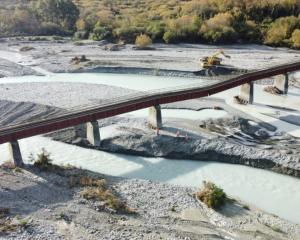
Dion Hodder, 16, was at a St John youth training camp on Motutapu Island in Auckland's Hauraki Gulf when he fell ill on Saturday afternoon.
He was airlifted to Auckland City Hospital with suspected meningococcal disease but died that night despite urgent medical treatment.
The bacterial infection has since been confirmed as the cause of death. Meningococcal disease can be fatal — especially in small children and teenagers — and is notoriously fast and difficult to diagnose.
A service will be held at the Turner Centre on Kerikeri's Cobham Rd at 2.30pm on Saturday.
Originally it was to have been held at the St John Ambulance station on Kerikeri Rd but with so many people expected it had to be shifted to a bigger venue.
About 100 St John Youth members are expected to travel from Auckland to farewell Dion, with at least as many from Kerikeri High School, where he was a Year 12 student.
St John Kerikeri station manager Nick Scott described Dion as a ''really neat kid'' who showed a lot of promise as a future ambulance officer.
''He was a really positive, bubbly character. He was always very quick with a quip or a bit of ribbing. He was a really neat kid, he'll be missed for sure. It's a very tragic loss,'' Scott said.
''It's one of those things — you have to give your own kids an extra hug, you never know what's around the next corner. Our hearts and thoughts are with his family.''
Scott said Dion had been part of the Kerikeri St John station since he was ''a wee nipper''.
''He'd been doing very well. He'd come up through all levels of St John Youth and he was destined for bigger and better things. He was very keen and showed a lot of promise.''
Though he was only 16, Scott said he had been talking to Dion about the possibility of attending St John training sessions and, once he turned 18, coming along on the ambulance.
His family was receiving a lot of support from the extended St John family, he said.
Meanwhile, Kerikeri High School principal Elizabeth Forgie said she spent the day at school on Monday with deputy principals and counsellors preparing for the students' return. They also phoned every staff member to make sure they were ready to talk to their classes.
A classroom had been set up with three counsellors for students who felt overwhelmed or upset and needed support. That would remain in place as long as it was needed.
Forgie said she had been assured the risk to other students was low, but an email being sent to all families and whānau on Tuesday afternoon would include health board advice and contact numbers.
Her thoughts went out to Dion's family and friends.
''They're at the top of our minds. It's a big school but it's a warm-hearted, small community, so the school is really feeling it,'' she said.''
Dion was part of a group of 165 youngsters aged 8-18 at the St John youth camp. All returned to Auckland by ferry where they were met by family members and St John representatives.
St John medical director Tony Smith said all were in good health. Some had been given antibiotic treatment in case they had been exposed to the bacteria.
''The risk of others being infected is low because the meningococcal bacterium is only spread by very close contact, or many hours of contact with an infected person,'' he said.
Northland public health nurses have also given antibiotics to anyone who might have been in close contact with Dion in the previous seven days.
Samples have been sent to an ESR laboratory in Wellington to identify which strain of the disease was responsible. Results are expected within a fortnight.
Symptoms can include fever, headache, vomiting, sleepiness, stiffness and an aversion to bright light. A rash can develop in late stages of the disease.
Meningococcal disease is sometimes referred to as meningitis, but meningitis (inflammation of the membranes around the brain) is a symptom of a number of viral and bacterial infections, not just meningococcal disease.
Anyone with concerns about the disease should phone Healthline on 0800 611 116 or visit a doctor without delay.
The Northern Advocate's archives show Dion was already winning awards when he was just 8 years old and a member of the St John Penguins, the organisation's programme for 6-8 year olds.
In 2009 he was first equal in his age division in a Northland-wide competition held in Okaihau. He was also a member of Kerikeri Scouts.












